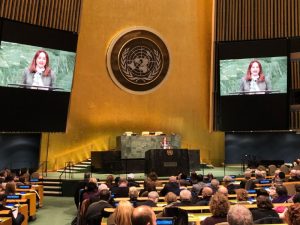– As delivered –
Statement by H.E. Mrs. María Fernanda Espinosa Garcés, President of the 73rd Session of the UN General Assembly
28 January 2019

Thank you, Ms. Smale, for the introduction and thank you, Mr. Secretary-General, for your remarks.
Excellencies,
Ladies and Gentlemen:
Allow me to begin by addressing today’s special guests, the survivors of the Holocaust. Dear friends, I am deeply humbled and touched by your presence here today.
Most of us in this room can never understand, nor begin to realize, the impact of that horror in your lives. Records and recordings, documentation and recollections, can never tell the full story of what remains one of the worst tragedies in human history.
In December, I visited the Auschwitz Concentration and Extermination Camp in Poland, where I had the solemn duty of placing a wreath before the ‘Wall of Death’. This is not a moment that I am likely to ever forget and it is one of the most powerful experiences of my life.
One cannot enter such a place and leave unchanged. And truly, I cannot think of that place and what it represents without worrying about what humanity is capable of inflicting.
Dear friends,
we must draw lessons from history and that is why it is so vital that we remember the Holocaust and honour the victims of that atrocity. I am proud to join you today in remembrance, for I believe it is only in remembering and in educating that we can ensure that the hate of others, the demonization of groups, and the cynical manipulation of opinion that promotes such hatred and violence, can be countered and stopped.
Recent developments in the world, including resurgent racism, anti-semitism, xenophobia, as well as hatred towards other minorities and religious expressions, teaches us, painfully, that we may never root out the impulse that led to the holocaust; but the same history also teaches us that when we are bold and quick to stand up against indifference, intolerance and injustice, those impulses do not flourish.
As we remember the holocaust today, in a time of peril for our world, with the ties that have bound our world together since the Second World War fraying,let us be clear: talking is not enough. As leaders and as citizens; as people of faith and as people of conscience, we need to stand up for what we believe. Our survival as a modern civilization, based on the rule of law and respect for human rights, and the dignity of every individual, depends upon it.
Last year we celebrated the 70th anniversary of the Universal Declaration of Human Rights, which is a testament of the rights of humans to dignity, liberty, equality, and brotherhood. Let us always remember these very fundamental principles.
Let us not forget that the United Nations was borne out of the ashes of the Second World War and the Holocaust to help people and societies to flourish, and to avoid, at all costs, the horrors of the past. The UN Charter and the Universal Declaration of Human Rights enshrined the values of equality, dignity and freedom.
On this note, I would also like to acknowledge the presence of World War II veterans here today. When the world was truly in turmoil, those who served on the frontlines risked their own lives to help protect millions more. We can never thank you enough for what you have done.
And it is brave women and men such as these that we see even today. With over 100,000 personnel spread across 14 missions worldwide, UN peacekeepers are fighting to protect human rights and maintain peace and security.
Just two weeks ago I had the opportunity to meet with women peacekeepers in-training in Islamabad, Pakistan. And I told them what I will tell you: we thank you; we thank the countries that continue to support peacekeeping operations; and we thank those that help to fund this critical, lifesaving work.
We must draw lessons from history and that is why it is so vital that we remember the Holocaust and honour the victims of that atrocity. I am proud to join you today in remembrance, for I believe it is only in remembering and in educating that we can ensure that the hate of others, the demonization of groups, and the cynical manipulation of opinion that promotes such hatred and violence, can be countered and stopped.
Friends, let us build on the transformative vision of the Charter of the UN and the Universal Declaration of Human Rights to renew our commitment to cooperative international relations and multilateralism for a safe and secure world.
Let us be guided in working together as the United Nations to respond to the many challenges that feed the anxieties of people everywhere, and provide fertile ground for the purveyors of hate.
And let us be united and resolute in working together to provide for education that encourages the values of positive citizenship, that forges in each heart acceptance and respect for the other. This requires that at all times we must be willing to defend the rights of everyone.
That is the only way we can honor the victims of the Holocaust; that is the only way we can learn from remembering what humankind is so tragically capable of; that is the only way we can save ourselves and succeeding generations from the abyss.
Thank you.
 Making the United Nations Relevant to all People
Making the United Nations Relevant to all People